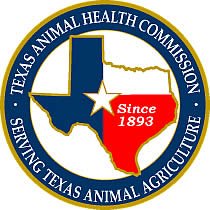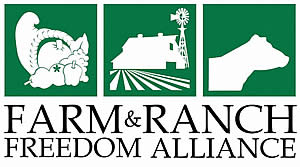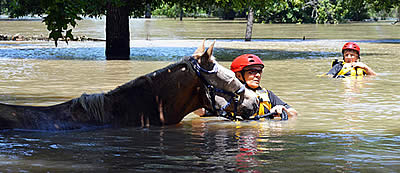AUSTIN – When Governor Abbott declared a preemptive state of disaster for 30 counties in advance of Tropical Depression Harvey; the Texas Animal Health Commission (TAHC) took the cue and accelerated preparations for what was predicted to be a major storm event. Under the State Emergency Management Plan, TAHC is the state’s coordinating agency for all disaster response issues related to animals, both large and small, including livestock, pets, and zoo animals. By the time Hurricane Harvey made landfall on Friday, August 25, the agency and its response partners were prepared for action.
The storm proved to be even more severe than predicted, and TAHC quickly set up an Animal Response Operations Coordination Center (AROCC) at its headquarters in Austin. Through daily operations at the AROCC, TAHC is striving to meet animal related response needs by coordinating efforts of state, federal, industry, and non-governmental cooperators with an animal focus. The AROCC can be reached at 512-719-0799, or 800-550-8242, ext. 799. The AROCC connects with the Governor’s Division of Emergency Management, through agency State Operations Center (SOC) assigned personnel.
TAHC has boots on the ground in some of the hardest hit areas of the state where local authorities have authorized entry, assessing animal issues resulting from Hurricane Harvey. Agency personnel deployed and continue to work with local disaster district committees, calling on resources to meet animal related needs locally whenever possible.
For animal issues related to Hurricane Harvey, owners should call their local animal control officer or their local emergency operations center for assistance.
Strong winds and rising flood waters destroyed fences and displaced large numbers of livestock. TAHC is coordinating with Texas A&M AgriLife Extension to establish livestock supply points in areas of critical need, and with Texas Department of Agriculture to receive and distribute donations of hay and livestock feed. TAHC requested the services of Texas & Southwestern Cattle Raisers (TSCRA) Special Rangers to assist in capturing stray livestock and returning them to rightful owners.
The number of shelters available to receive animals is at 74 and growing as response efforts progress. In addition to pre-designated shelters, the TAHC has received numerous offers of sheltering space from livestock owners with pasture or barn space. With their permission, this information has been forwarded to the 2-1-1 operators and posted on our website at http://www.tahc.texas.gov/emergency/TAHC_SheltersHoldingFacilities.pdf.
With the help of United States Department of Agriculture (USDA), Animal and Plant Health Inspection Service, Animal Care and non-governmental organizations, TAHC is supporting evacuation, sheltering, and care of companion and zoo animals. Many veterinarians and veterinary technicians have volunteered to provide care where needed. TAHC is compiling these resources and sharing information with emergency response centers and shelters.
Updates will be provided as new information becomes available and assessment teams are able to report damages and needs for assistance.
“Our hearts go out to all who are affected by Hurricane Harvey,” said Dr. Andy Schwartz, TAHC Executive Director. “It is a tumultuous time in our State, but we are grateful for the support and resources our industry, government partners, non-governmental partners, and neighbors are providing.”
Response Partners actively supporting the AROCC include: Texas Southwestern Cattle Raisers Association, Texas Cattle Feeders Association, Independent Cattlemen’s Association, Texas Farm Bureau, Texas Pork Producers, Texas Association of Dairymen, Texas Sheep and Goat Raisers, Texas Poultry Federation, SPCA, Texas Department of Emergency Management, Texas Forest Service, Texas Commission on Environmental Quality, Texas Department of Agriculture, Texas Veterinary Medical Association, Texas A&M AgriLife Extension, Texas A&M Veterinary Emergency Team, USDA – Farm Service Agency, and USDA – Wildlife Services.
For the latest information on Hurricane Harvey animal response efforts, visit www.tahc.texas.gov.
For more information, contact the Public Information Dept. at 512-719-0750 or at public_info@tahc.texas.gov.



